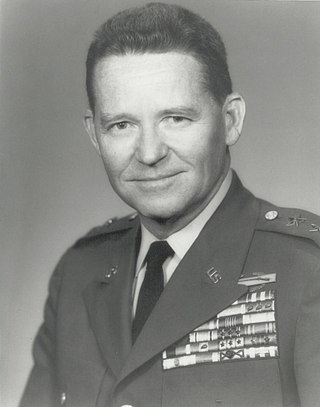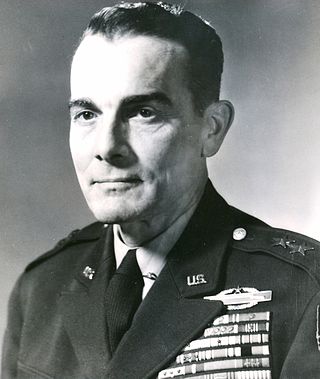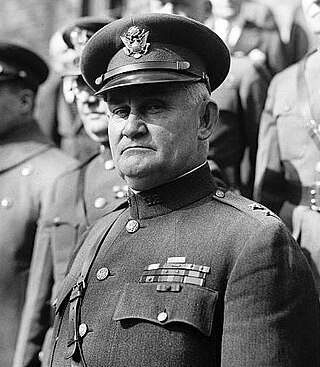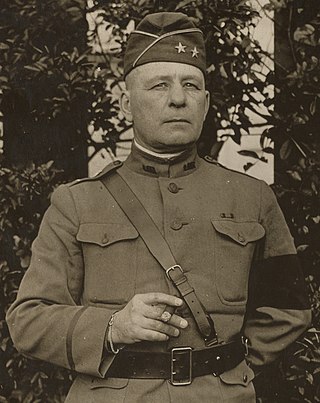
The Croix de Guerre is a military decoration of France. It was first created in 1915 and consists of a square-cross medal on two crossed swords, hanging from a ribbon with various degree pins. The decoration was first awarded during World War I, again in World War II, and in other conflicts; the croix de guerre des théâtres d'opérations extérieures was established in 1921 for these. The Croix de Guerre was also commonly bestowed on foreign military forces allied to France.

Joseph Alexander McChristian was a United States Army Major General and the assistant chief of staff for intelligence, Military Assistance Command, Vietnam from July 13, 1965 to June 1, 1967. As J-2, MACV, he predicted that the North Vietnamese would attack in full force, which they did during the 1968 Tet offensive. His prediction was unpopular because the official policy was that US and South Vietnamese forces were winning the war.

Francis Bowditch Wilby was a major general in the United States Army who served as the 39th Superintendent of the United States Military Academy from 1942 to 1945, during World War II.

Lieutenant General Louis Watson Truman was a senior United States Army officer. He served as Commanding General of the Third United States Army. Truman's father, Major General Ralph E. Truman, was a cousin of President Harry S. Truman, and he served as his Aide-de-Camp during Truman's inauguration in 1948.

Colonel Russell Potter "Red" Reeder Jr. was a United States Army officer and writer.

Robert Lee Howze was a United States Army major general who was a recipient of the Medal of Honor for his actions during the American Indian Wars.

William Durward Connor was a career United States Army officer who became a superintendent of the United States Military Academy after originally serving in the Corps of Engineers. While stationed in the Philippines, he participated in the Spanish–American War. He later served with the American Expeditionary Forces during World War I.

Major General Edward Fenton McGlachlin Jr. was a United States Army officer who distinguished himself during World War I.

Major General William Weigel was a United States Army officer who, throughout his long military career, served in numerous conflicts and wars, most notably towards the end of World War I, commanding the 56th Brigade of the 28th Division before taking command of the 88th Division in the war's final weeks.

Colonel John Leonard Hines Jr. was an officer in the United States Army and the son of General John L. Hines.

Herbert William Ehrgott was a brigadier general in the United States Air Force.

Halstead Dorey was a highly decorated officer in the United States Army with the rank of major general. A graduate of West Point, Dorey distinguished himself as Colonel and Commanding officer, 4th Infantry Regiment during World War I and was decorated with Distinguished Service Cross, the second highest military award for extreme gallantry in combat, and also received the Distinguished Service Medal.

Wilson Bryant Burtt was a career United States Army officer and served as a brigadier general during World War I.

Major General Frank Otto Bowman CBE was a United States Army officer.

Hanson Edward Ely was a United States Army officer in the late 19th and early 20th centuries. He served in several conflicts, including the Spanish–American War and World War I, and he received the Army Distinguished Service Medal and numerous other awards for his role in them.

William Mason Fassett was a United States Army officer in the late 19th and early 20th centuries. He served in the Spanish–American War, Philippine–American War, and World War I, and he received the Army Distinguished Service Medal among several other awards.

James Lawton Collins Jr. was a brigadier general in the U.S. Army who served in World War II, the Korean War and the Vietnam War, a military historian, and a viticulturist. He was the son of Major General James Lawton Collins, nephew of General J. Lawton Collins, who served as Chief of Staff of the Army during the Korean War, and older brother of Apollo 11 astronaut Major General Michael Collins. He led a North Dakota National Guard artillery battalion in Normandy in 1944, and served as the U.S. Army Chief of Military History from 1970 to 1982.

Major General LeRoy Springs Lyon was a United States Army officer.

Frederic J. Brown II was a career officer in the United States Army. A veteran of World War II, he was most notable for serving in senior command assignments, including the 3rd Armored Division, V Corps, Allied Land Forces South-Eastern Europe, Sixth United States Army, and the Army Logistics Systems Study Group. Brown attained the rank of lieutenant general and was a recipient of two awards of the Army Distinguished Service Medal, two awards of the Silver Star, two awards of the Legion of Merit, the Bronze Star Medal, and the Air Medal.

John W. Bowen was a career officer in the United States Army. A veteran of World War II and the Korean War, he served in the Organized Reserve Corps from 1927 to 1928, and in the army from 1932 to 1968, and he attained the rank of lieutenant general. His commands included the 26th Infantry Regiment (1943), 82nd Airborne Division (1956–1957), Third United States Army (1964), and XVIII Airborne Corps (1964–1965). Among his awards and decorations were four awards of the Army Distinguished Service Medal, Silver Star (2), Legion of Merit, Bronze Star Medal, Croix de Guerre (France), Order of Military Merit, Republic of Korea Presidential Unit Citation, Combat Infantryman Badge, and Senior Parachutist Badge.





















